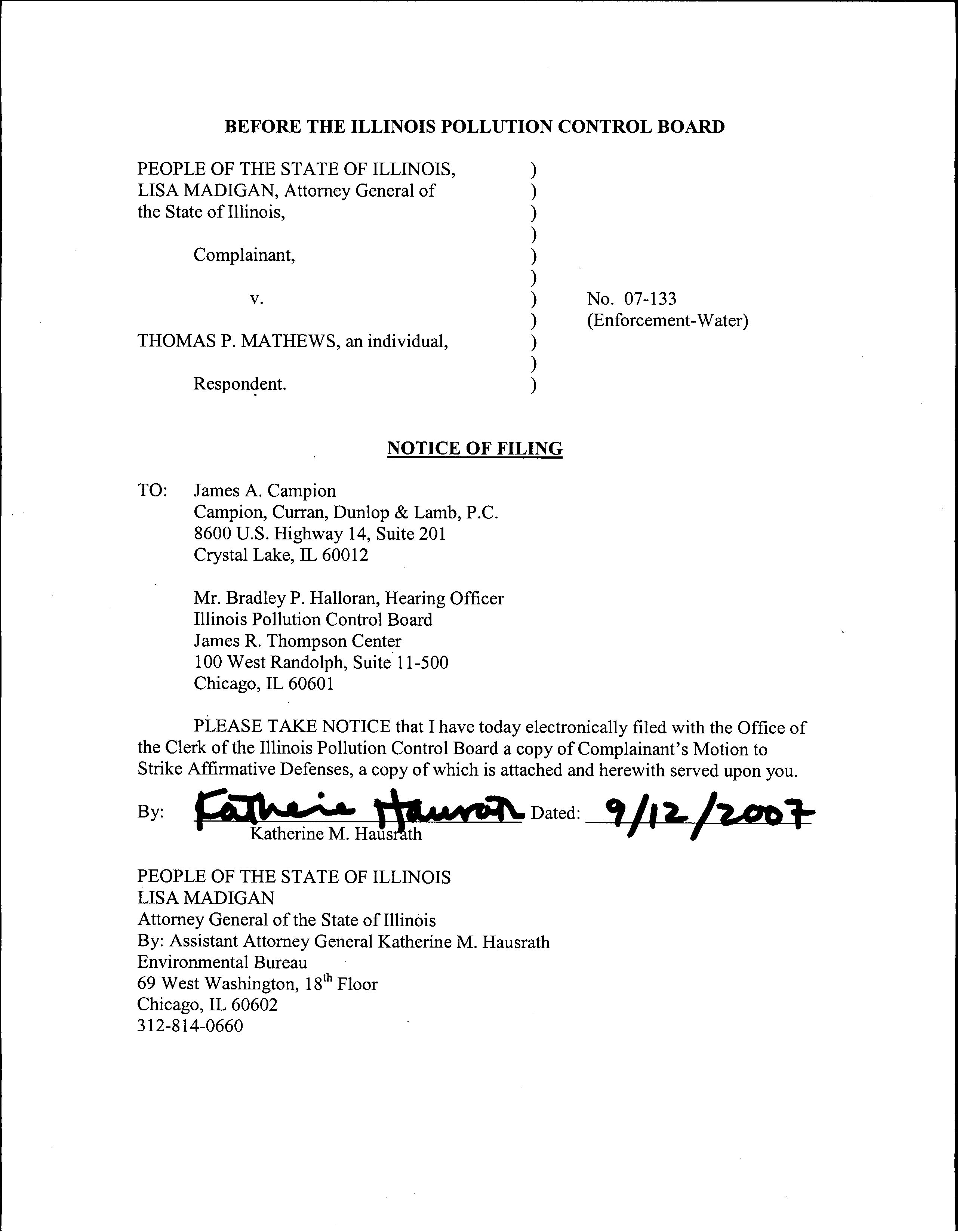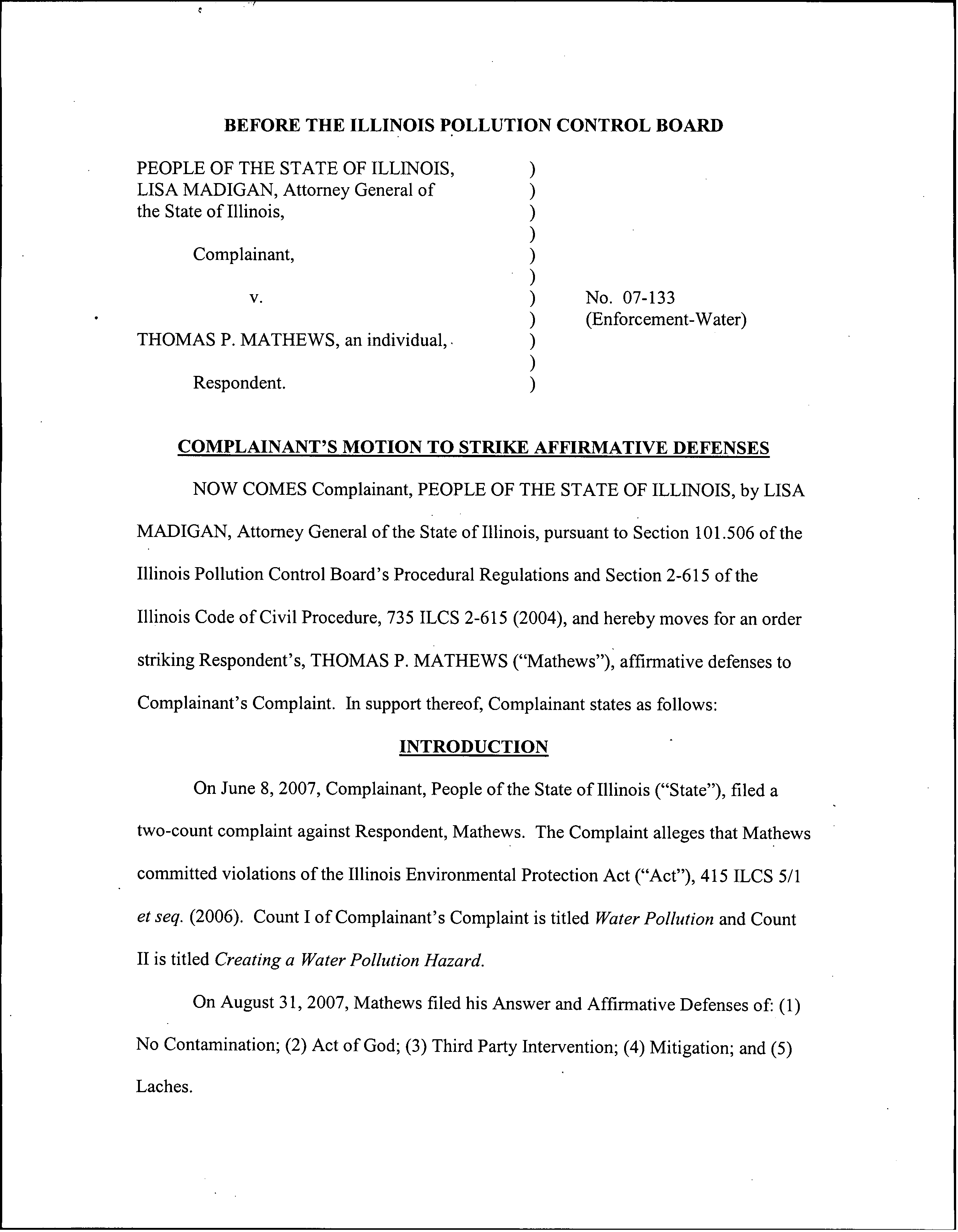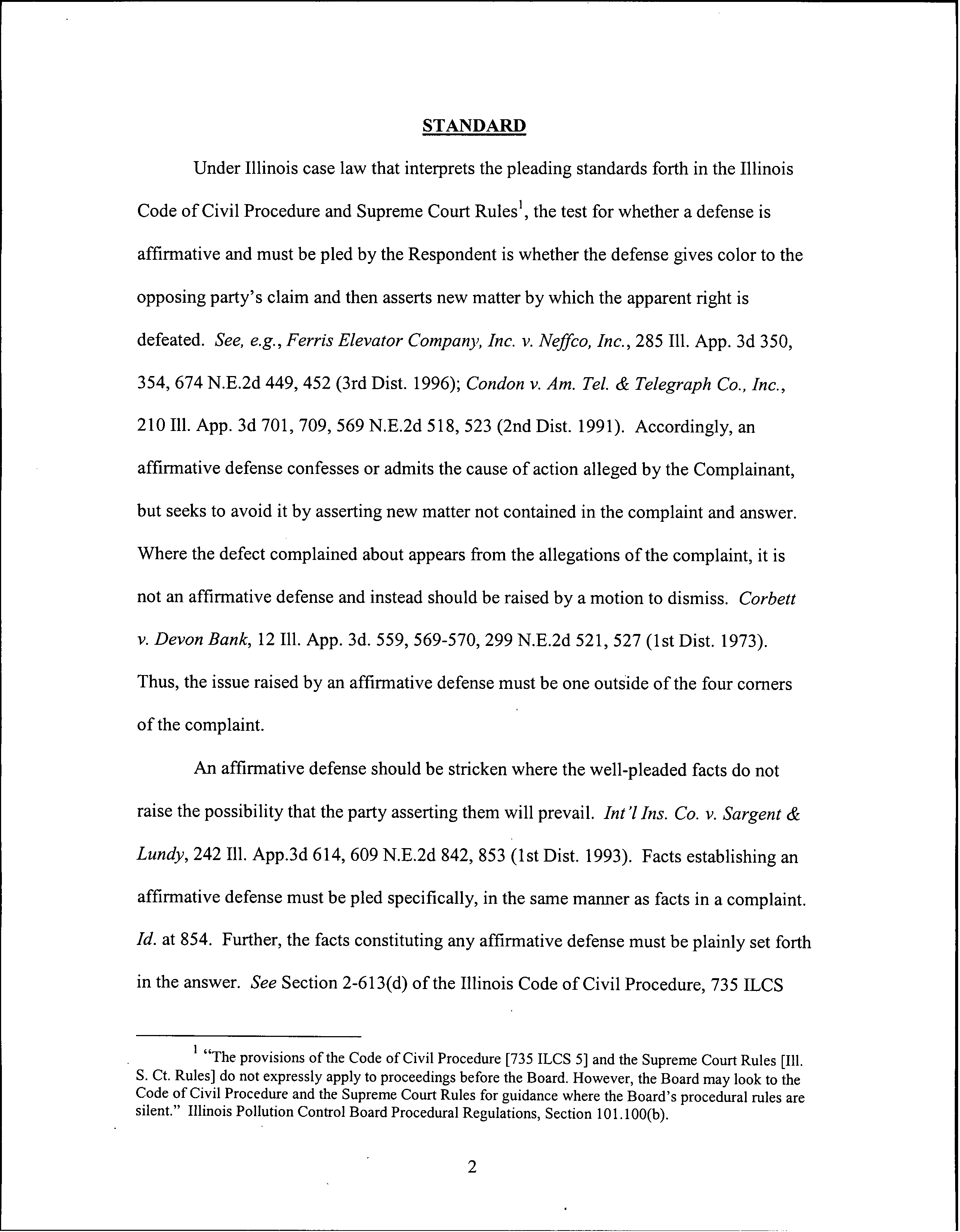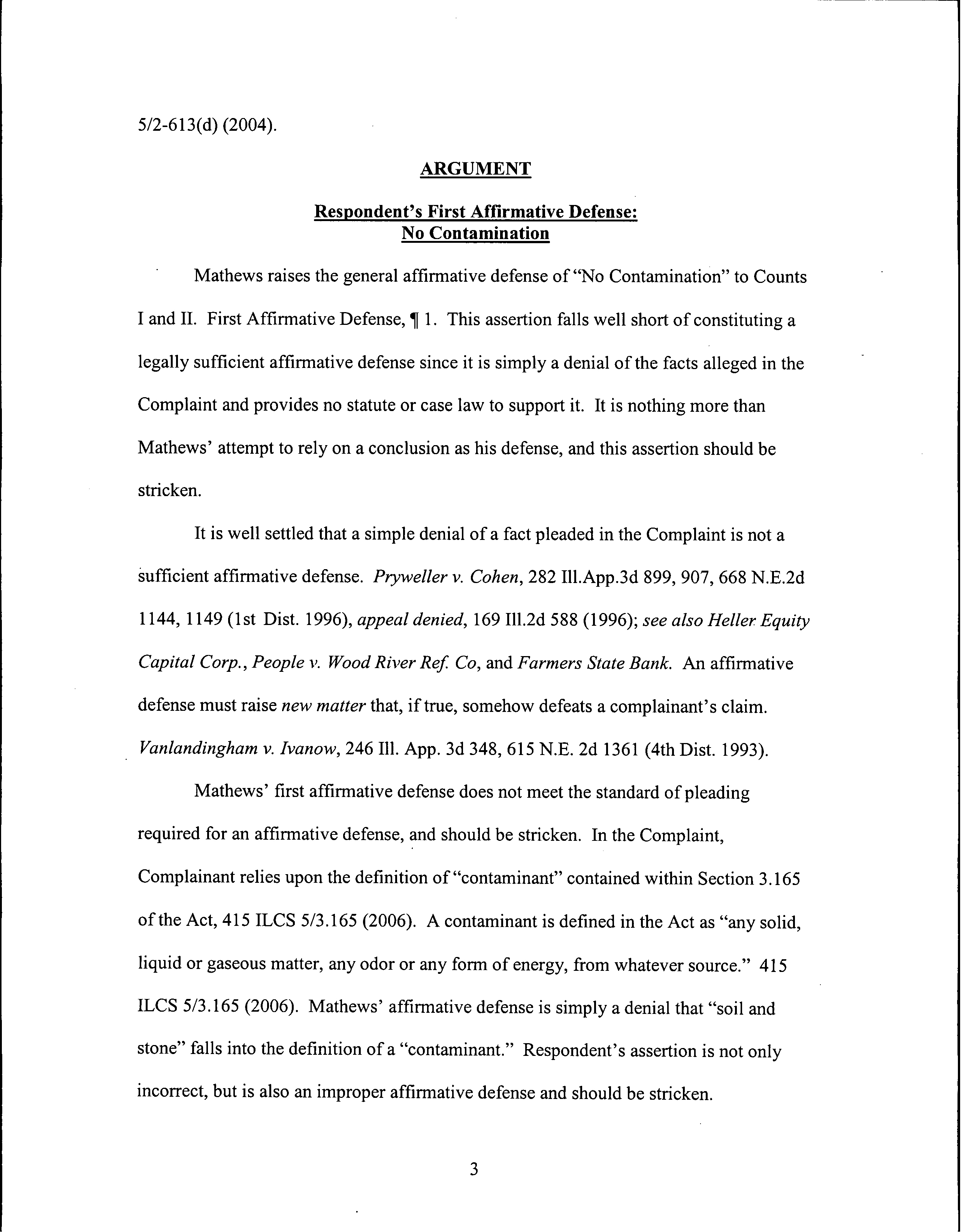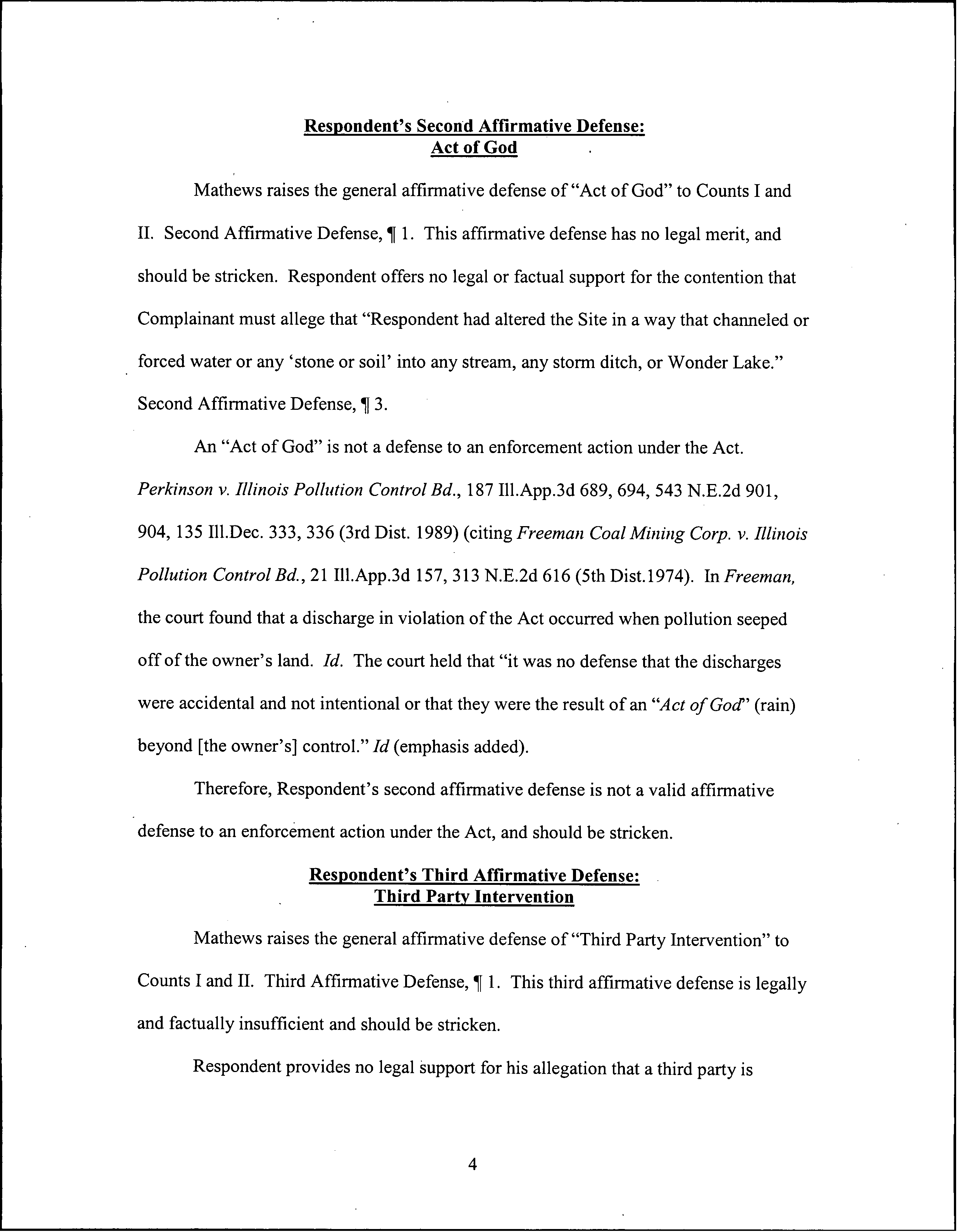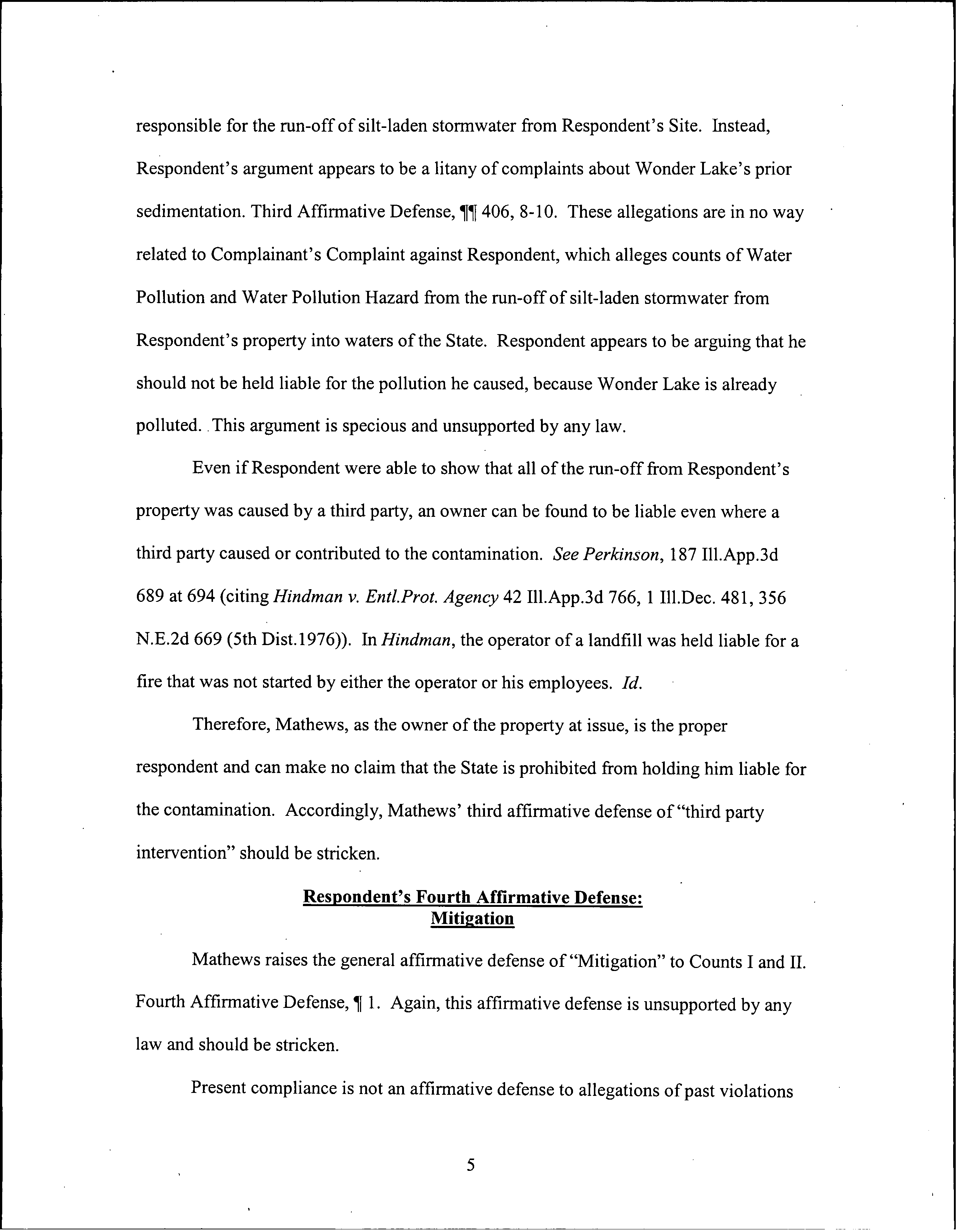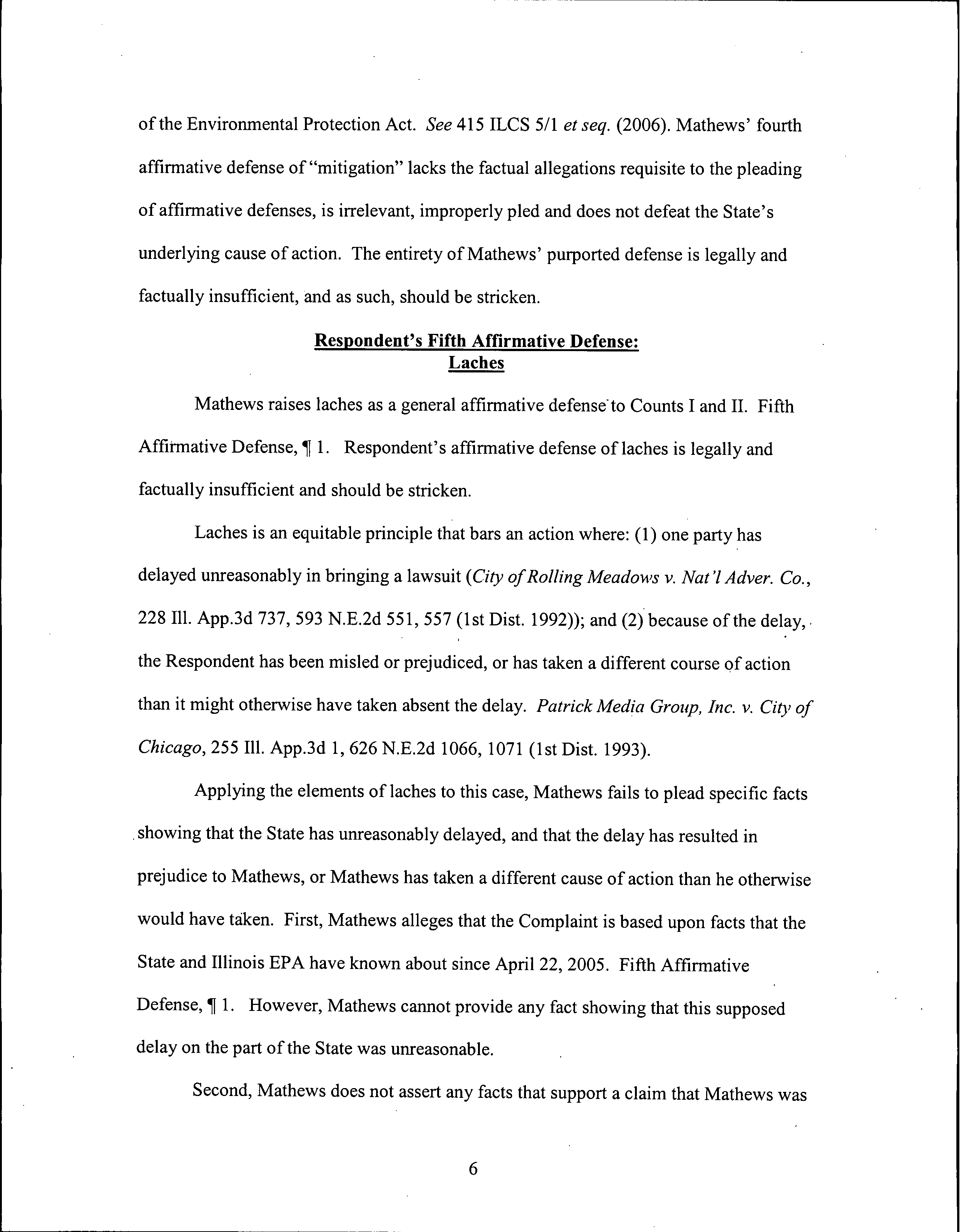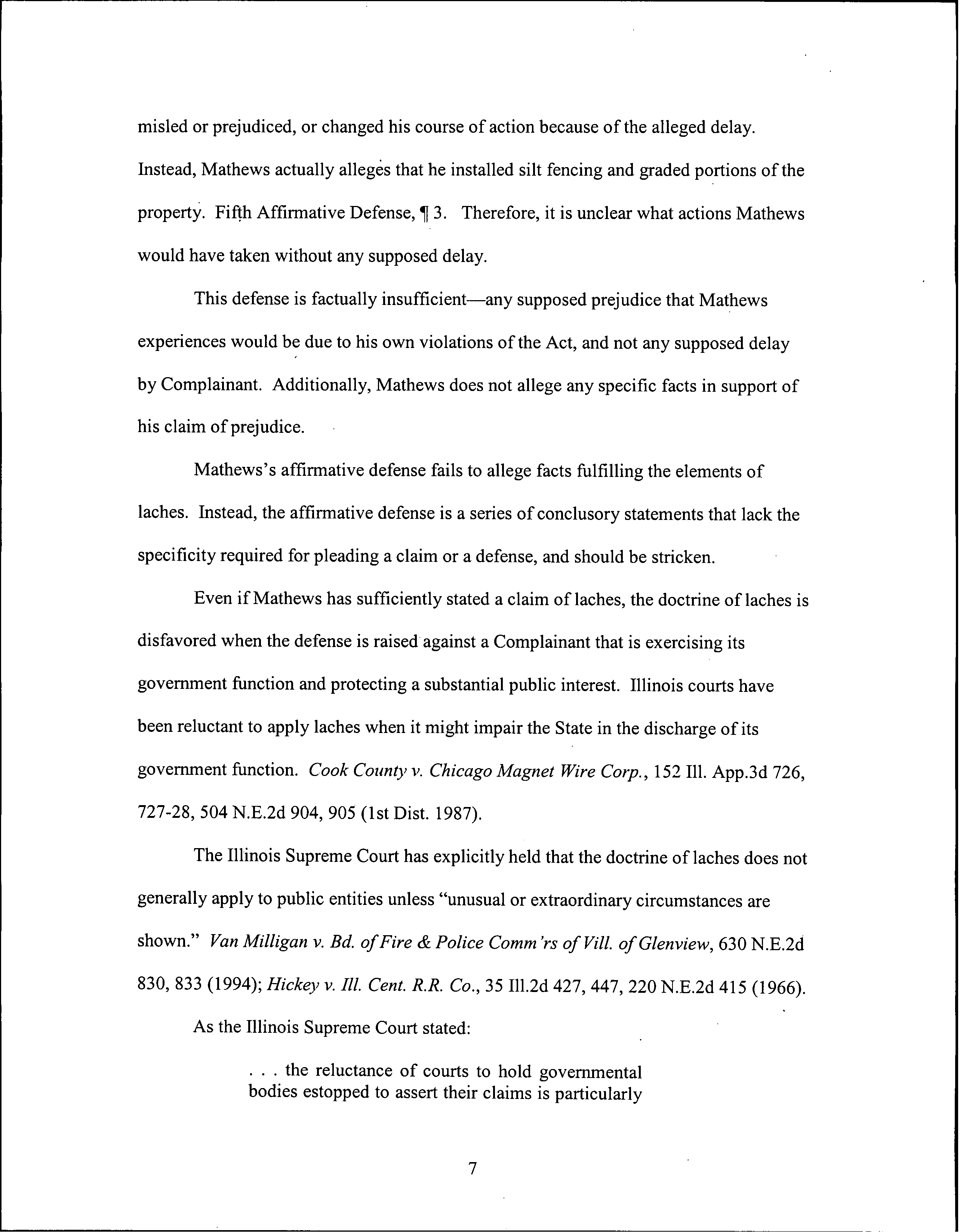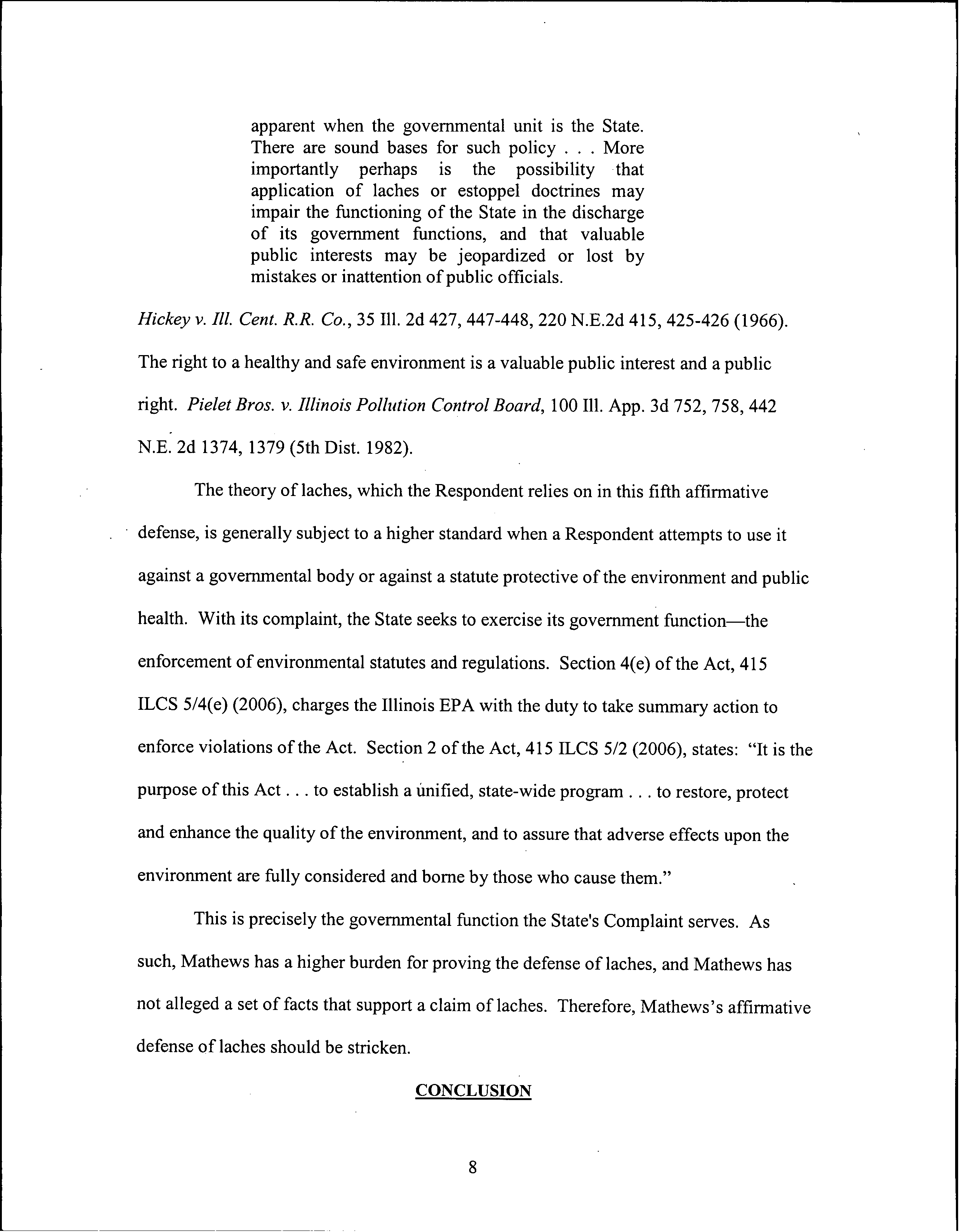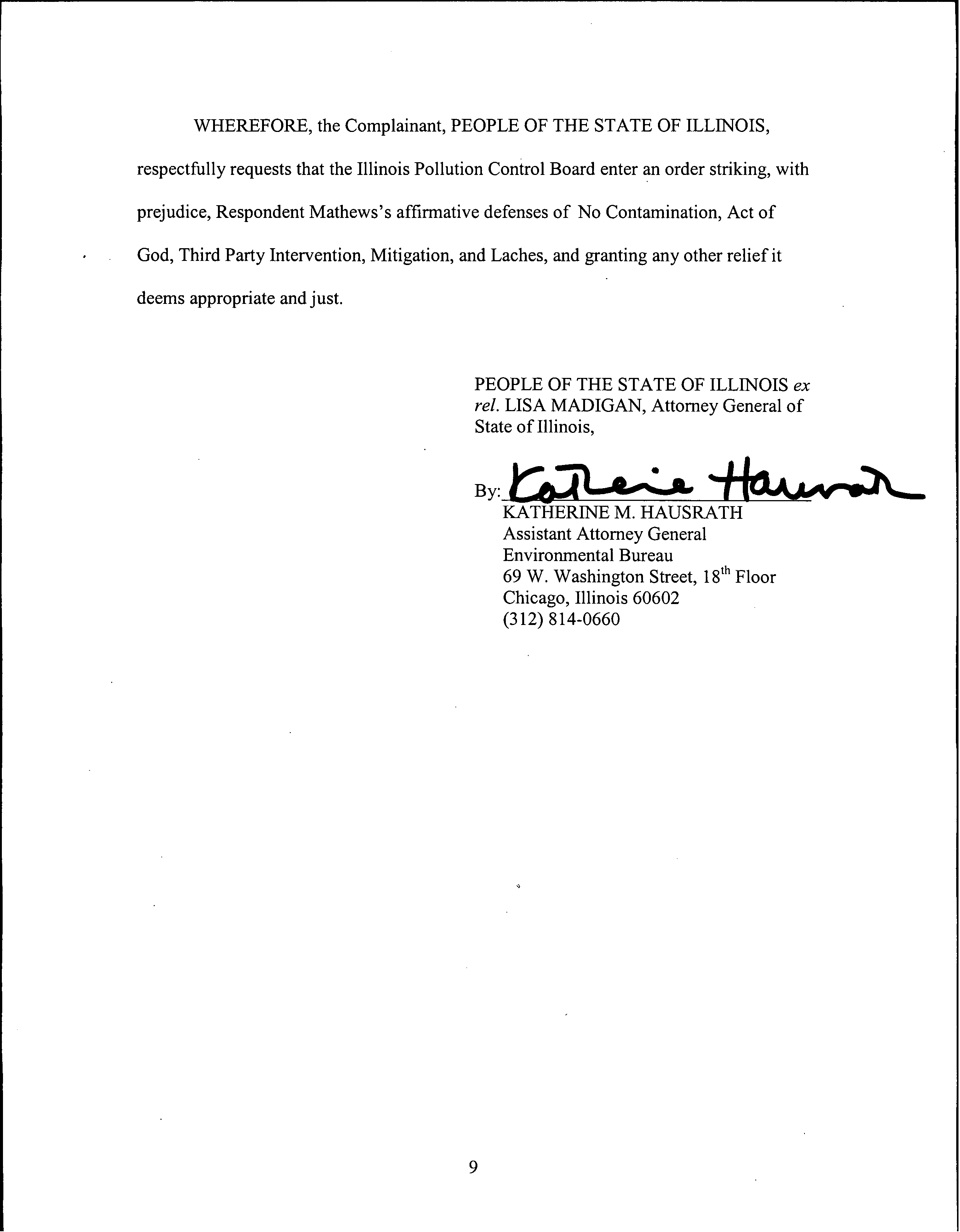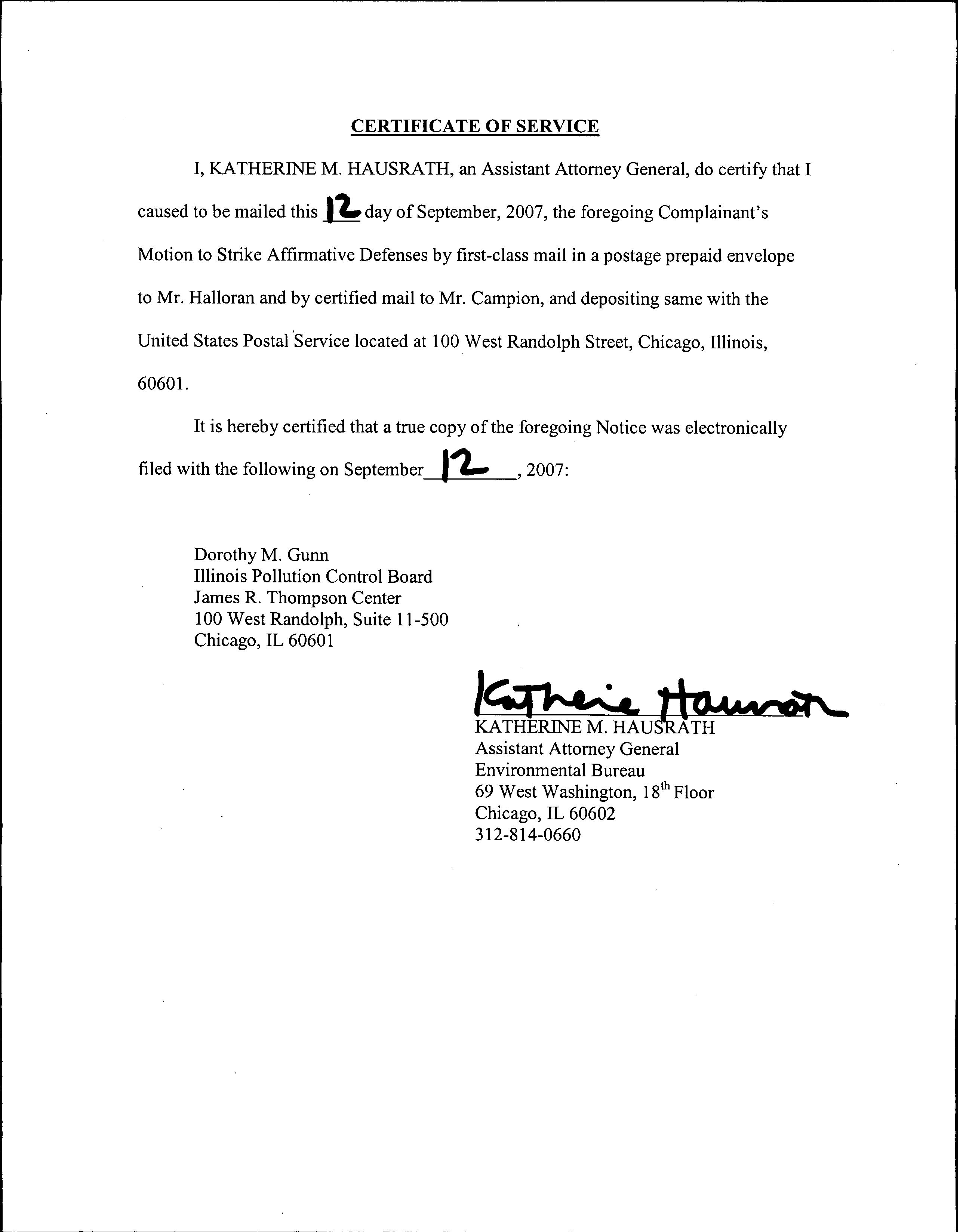BEFORE THE ILLINOIS POLLUTION CONTROL BOARD
PEOPLE OF THE STATE OF ILLINOIS,
LISA MADIGAN, Attorney General
of
the State of Illinois,
Complainant,
v.
THOMAS P. MATHEWS, an individual,
Respon~ent.
)
)
)
)
)
)
)
)
)
)
)
No. 07-133
(Enforcement-Water)
NOTICE OF FILING
TO:
James A. Campion
Campion, Curran, Dunlop
&
Lamb, P.C.
8600 U.S. Highway 14, Suite 201
Crystal Lake, IL 60012
Mr. Bradley P. Halloran, Hearing Officer
Illinois Pollution Control Board
James R. Thompson Center
100 West Randolph, Suite 11-500
Chicago,
IL 60601
pLEASE TAKE NOTICE that I have today electronically filed with the Office of
the Clerk of the Illinois Pollution Control Board a copy of Complainant'sMotion to
Strike Affirmative Defenses, a copy
of which is attached and herewith served upon you.
By:
,......~
..,,;.
J.!.JII.-
...
~
...I••
Dated:
~~
--.-#---it--.",r-....
~
Katherine M.
Ha~s
th
PEOPLE OF THE STATE OF ILLINOIS
LISA
MADIGAN
Attorney General of the State of Illinois
By: Assistant Attorney General Katherine M. Hausrath
Environmental Bureau
69 West Washington, 18
th
Floor
Chicago, IL 60602
312-814-0660
Electronic Filing, Received, Clerk's Office, September 12, 2007
BEFORE THE ILLINOIS POLLUTION CONTROL BOARD
PEOPLE OF THE STATE OF ILLINOIS,
LISA MADIGAN, Attorney General
of
the State of Illinois,
Complainant,
v.
THOMAS P. MATHEWS, an individual, .
Respondent.
)
)
)
)
)
)
)
)
)
)
)
No. 07-133
(Enforcement-Water)
COMPLAINANT'S MOTION TO STRIKE AFFIRMATIVE DEFENSES
NOW COMES Complainant, PEOPLE OF THE STATE OF ILLINOIS, by LISA
MADIGAN, Attorney General
of the State of Illinois, pursuant to Section 101.506 of the
Illinois Pollution Control Board'sProcedural Regulations and Section 2-615
of the
Illinois Code of Civil Procedure, 735 ILCS 2-615 (2004), and hereby moves for an order
striking Respondent's, THOMAS
P. MATHEWS ("Mathews"), affirmative defenses to
Complainant's Complaint. In support thereof, Complainant states as follows:
INTRODUCTION
On June 8, 2007, Complainant, People
of the State of Illinois ("State"), filed a
two-count complaint against Respondent, Mathews. The Complaint alleges that Mathews
committed violations
of the Illinois Environmental Protection Act ("Act"), 415 ILCS 5/1
et seq.
(2006). Count I of Complainant's Complaint is titled
Water Pollution
and Count
II is titled
Creating a Water Pollution Hazard.
On August 31, 2007, Mathews filed his Answer and Affirmative Defenses of:
(1)
No Contamination; (2) Act of God; (3) Third Party Intervention; (4) Mitigation; and (5)
Laches.
Electronic Filing, Received, Clerk's Office, September 12, 2007
STANDARD
Under Illinois case law that interprets the pleading standards forth in the Illinois
Code
of Civil Procedure and Supreme Court Rules
1
,
the test for whether a defense is
affirmative and must be pled by the Respondent is whether the defense gives color to the
opposing party'sclaim and then asserts new matter by which the apparent right is
defeated.
See, e.g., Ferris Elevator Company, Inc.
v. Neffco, Inc.,
285 Ill. App. 3d 350,
354,674 N.E.2d 449, 452 (3rd Dist. 1996);
Condon v. Am. Tel.
&
Telegraph Co., Inc.,
210 Ill. App. 3d 701, 709, 569 N.E.2d 518, 523 (2nd Dist. 1991). Accordingly, an
affirmative defense confesses or admits the cause
of action alleged by the Complainant,
but seeks to avoid it
by asserting new matter not contained in the complaint and answer.
Where the defect complained about appears from the allegations
of the complaint, it is
not an affirmative defense and instead should be raised by a motion to dismiss.
Corbett
v. Devon Bank,
12 Ill. App. 3d. 559, 569-570, 299 N.E.2d 521, 527 (1st Dist. 1973).
Thus, the issue raised
by an affirmative defense must be one outside of the four comers
of the complaint.
An
affirmative defense should be stricken where the well-pleaded facts do not
raise the possibility that the party asserting them will prevail.
Int'lIns. Co. v. Sargent
&
Lundy,
242 Ill. App.3d 614,609 N.E.2d 842,853 (1st Dist. 1993). Facts establishing an
affirmative defense must be pled specifically, in the same manner as facts in a complaint.
!d.
at 854. Further, the facts constituting any affirmative defense must be plainly set forth
in the answer.
See
Section 2-613(d)
of the Illinois Code of Civil Procedure, 735 ILCS
1 "The provisions of the Code of Civil Procedure [735 ILCS 5] and the Supreme Court Rules
[Ill.
S. Ct. Rules] do not expressly apply to proceedings before the Board. However, the Board may look to the
Code
of Civil Procedure and the Supreme Court Rules for guidance where the Board'sprocedural rules are
silent." Illinois Pollution Control Board Procedural Regulations, Section 10
1.1 OO(b).
2
Electronic Filing, Received, Clerk's Office, September 12, 2007
5/2-613(d) (2004).
ARGUMENT
Respondent's
First Affirmative Defense:
No Contamination
Mathews raises the general affirmative defense of "No Contamination" to Counts
I and II. First Affirmative Defense,
~
1. This assertion falls well short of constituting a
legally sufficient affirmative defense since it is simply a denial
of the facts alleged in the
Complaint and provides no statute or case law to support it.
It
is nothing more than
Mathews' attempt to rely on a conclusion as his defense, and this assertion should be
stricken.
It
is well settled that a simple denial of a fact pleaded in the Complaint is not a
sufficient affirmative defense.
Pryweller
v.
Cohen,
282 Ill.App.3d 899, 907, 668 N.E.2d
1144, 1149 (1st Dist. 1996),
appeal denied,
169 Il1.2d 588 (1996);
see also Heller Equity
Capital Corp., People
v. Wood River Ref Co,
and
Farmers State Bank.
An
affirmative
defense must raise
new matter
that, if true, somehow defeats a complainant'sclaim.
Vanlandingham
v.
!vanow,
246 Ill. App. 3d 348,615 N.E. 2d 1361 (4th Dist. 1993).
Mathews' first affirmative defense does not meet the standard
of pleading
required for an affirmative defense, and should be stricken. In the Complaint,
Complainant relies upon the definition
of "contaminant" contained within Section 3.165
ofthe Act, 415 ILCS 5/3.165 (2006). A contaminant is defined in the Act as "any solid,
liquid or gaseous matter, any odor or any form
of energy, from whatever source." 415
ILCS 5/3.165 (2006). Mathews' affirmative defense is simply a denial that "soil and
stone" falls into the definition
of a "contaminant." Respondent's assertion is not only
incorrect, but is also an improper affirmative defense and should be stricken.
3
Electronic Filing, Received, Clerk's Office, September 12, 2007
Respondent's Second Affirmative Defense:
Act
of God
Mathews raises the general affinnative defense of "Act of God" to Counts I and
II. Second Affinnative Defense,
~
1. This affinnative defense has no legal merit, and
should be stricken. Respondent offers no legal or factual support for the contention that
Complainant must allege that "Respondent had altered the Site in a way that channeled or
forced water
or any 'stoneor soil' into any stream, any stonn ditch, or Wonder Lake."
Second Affinnative Defense,
~
3.
An
"Act of God" is not a defense to an enforcement action under the Act.
Perkinson
v.
Illinois Pollution Control Bd.,
187 Ill.App.3d 689, 694, 543 N.E.2d 901,
904, 135 Ill.Dec. 333, 336 (3rd Dist. 1989) (citing
Freeman Coal Mining Corp.
v.
Illinois
Pollution Control Bd.,
21 Ill.App.3d 157,313 N.E.2d 616 (5th Dist.1974). In
Freeman,
the court found that a discharge in violation of the Act occurred when pollution seeped
off of the owner's land.
!d.
The court held that "it was no defense that the discharges
were accidental and not intentional or that they were the result
of an
"Act ofGod"
(rain)
beyond [the owner's] control."
Id
(emphasis added).
Therefore, Respondent's second affinnative defense is not a valid affinnative
defense to an enforcement action under the Act, and should be stricken.
Respondent's Third Affirmative Defense:
Third Party Intervention
Mathews raises the general affinnative defense of "Third Party Intervention" to
Counts I and II. Third Affinnative Defense,
~
1. This third affinnative defense is legally
and factually insufficient and should be stricken.
Respondent provides no legal support for his allegation that a third party is
4
Electronic Filing, Received, Clerk's Office, September 12, 2007
responsible for the run-off of silt-laden stonnwater from Respondent's Site. Instead,
Respondent's argument appears to be a litany
of complaints about Wonder Lake'sprior
sedimentation. Third Affinnative Defense,
~~
406, 8-10. These allegations are in no way
related to Complainant's Complaint against Respondent, which alleges counts
of Water
Pollution and Water Pollution Hazard from the run-off of silt-laden stonnwater from
Respondent'sproperty into waters
of the State. Respondent appears to be arguing that he
should not be held liable for the pollution he caused, because Wonder Lake is already
polluted
.. This argument is specious and unsupported by any law.
Even
if Respondent were able to show that all of the run-off from Respondent's
property was caused
by a third party, an owner can be found to be liable even where a
third party caused or contributed to the contamination.
See Perkinson,
187 Ill.App.3d
689 at 694 (citing
Hindman
v.
Entl.Prot. Agency
42 Ill.App.3d 766, 1 Ill.Dec. 481, 356
N.E.2d 669 (5th Dist.1976)). In
Hindman,
the operator
of a landfill was held liable for a
fire that was not started by either the operator or his employees.
Id.
Therefore, Mathews, as the owner
of the property at issue, is the proper
respondent and can make no claim that the State is prohibited from holding him liable for
the contamination. Accordingly, Mathews' third affinnative defense
of "third party
intervention" should be stricken.
Respondent's Fourth Affirmative Defense:
Mitigation
Mathews raises the general affinnative defense of "Mitigation" to Counts I and II.
Fourth Affinnative Defense,
~
1. Again, this affinnative defense is unsupported by any
law and should be stricken.
Present compliance is not an affinnative defense to allegations
of past violations
5
Electronic Filing, Received, Clerk's Office, September 12, 2007
of the Environmental Protection Act.
See
415 ILCS 5/1
et seq.
(2006). Mathews' fourth
affirmative defense
of "mitigation" lacks the factual allegations requisite to the pleading
of affirmative defenses, is irrelevant, improperly pled and does not defeat the State's
underlying cause of action. The entirety of Mathews' purported defense is legally and
factually insufficient, and as such, should be stricken.
Respondent's Fifth Affirmative Defense:
Laches
Mathews raises laches as a general affirmative defense'to Counts I and II. Fifth
Affinnative Defense,
~
1. Respondent's affirmative defense of laches is legally and
factually insufficient and should be stricken.
Laches is an equitable principle that bars an action where: (1) one party has
delayed unreasonably in bringing a lawsuit
(City ofRolling Meadows
v.
Nat
'I
Adver. Co.,
228 Ill. App.3d 737, 593 N.E.2d 551, 557 (1st Dist. 1992)); and (2) because of the delay"
the Respondent has been misled or prejudiced, or has taken a different course
of action
than it might otherwise have taken absent the delay.
Patrick Media Group, Inc.
v.
City of
Chicago,
255 Ill. App.3d
1,626
N.E.2d 1066, 1071 (1st Dist. 1993).
Applying the elements
of laches to this case, Mathews fails to plead specific facts
.showing that the State has unreasonably delayed, and that the delay has resulted in
prejudice to Mathews, or Mathews has taken a different cause
of action than he otherwise
would have taken. First, Mathews alleges that the Complaint is based upon facts that the
State and Illinois EPA have known about since April 22, 2005. Fifth Affirmative
Defense,
~
1. However, Mathews cannot provide any fact showing that this supposed
delay on the part
of the State was unreasonable.
Second, Mathews does not assert any facts that support a claim that Mathews was
6
Electronic Filing, Received, Clerk's Office, September 12, 2007
misled or prejudiced, or changed his course of action because of the alleged delay.
Instead, Mathews actually alleges that he installed silt fencing and graded portions
ofthe
property. Fifth Affirmative Defense,
~
3. Therefore, it is unclear what actions Mathews
would have taken without any supposed delay.
This defense is factually
insufficient-any supposed prejudice that Mathews
experiences would be due to his own violations
of the Act, and not any supposed delay
by Complainant. Additionally, Mathews does not allege any specific facts in support
of
his claim ofprejudice.
Mathews's affirmative defense fails to allege facts fulfilling the elements
of
laches. Instead, the affirmative defense is a series of conclusory statements that lack the
specificity required for pleading a claim or a defense, and should be stricken.
Even
if Mathews has sufficiently stated a claim oflaches, the doctrine oflaches is
disfavored when the defense is raised against a Complainant that is exercising its
government function and protecting a substantial public interest. Illinois courts have
been reluctant to apply laches when it might impair the State in the discharge
of its
government function.
Cook County
v. Chicago Magnet Wire Corp.,
152 Ill. App.3d 726,
727-28,504 N.E.2d 904,905 (1st Dist. 1987).
The Illinois Supreme Court has explicitly held that the doctrine
oflaches does not
generally apply to public entities unless "unusual or extraordinary circumstances are
shown."
Van Milligan v. Ed. ofFire
&
Police Comm 'rs of Vill. ofGlenview,
630 N.E.2d
830,833 (1994);
Hickey
v. Ill. Cent. R.R. Co.,
35 Il1.2d 427,447,220 N.E.2d 415 (1966).
As the Illinois Supreme Court stated:
. . . the reluctance
of courts to hold governmental
bodies estopped to assert their claims is particularly
7
Electronic Filing, Received, Clerk's Office, September 12, 2007
apparent when the governmental unit is the State.
There are sound bases for such policy . . . More
importantly perhaps is the possibility that
application
of laches or estoppel doctrines may
impair the functioning of the State in the discharge
of its government functions, and that valuable
public interests may be jeopardized or lost
by
mistakes or inattention of public officials.
Hickey
v.
Ill. Cent. R.R. Co.,
35 Ill. 2d 427,447-448,220 N.E.2d 415,425-426 (1966).
The right to a healthy and safe environment is a valuable public interest and a public
right.
Pielet Bros.
v.
Illinois Pollution Control Board,
100 Ill. App. 3d 752, 758, 442
N.E. 2d 1374, 1379 (5th Dist. 1982).
The theory
of laches, which the Respondent relies on in this fifth affirmative
defense, is generally subject to a higher standard when a Respondent attempts to use it
against a governmental body or against a statute protective
of the environment and public
health. With its complaint, the State seeks to exercise its government function-the
enforcement of environmental statutes and regulations. Section 4(e) of the Act, 415
ILCS 5/4(e) (2006), charges the Illinois EPA with the duty to take summary action to
enforce violations
of the Act. Section 2 of the Act, 415 ILCS 5/2 (2006), states:
"It
is the
purpose
of this Act ... to establish a unified, state-wide program ... to restore, protect
and enhance the quality of the environment, and to assure that adverse effects upon the
environment are fully considered and borne
by those who cause them."
This is precisely the governmental function the State's Complaint serves. As
such, Mathews has a higher burden for proving the defense
of laches, and Mathews has
not alleged a set
of facts that support a claim of laches. Therefore, Mathews's affirmative
defense
of laches should be stricken.
CONCLUSION
8
Electronic Filing, Received, Clerk's Office, September 12, 2007
WHEREFORE, the Complainant, PEOPLE OF THE STATE OF ILLINOIS,
respectfully requests that the Illinois Pollution Control Board enter an order striking, with
prejudice, Respondent Mathews's affinnative defenses
of No Contamination, Act of
God, Third Party Intervention, Mitigation, and Laches, and granting any other relief it
deems appropriate and just.
PEOPLE OF THE STATE OF ILLINOIS
ex
reI.
LISA MADIGAN, Attorney General of
State of Illinois,
BY:~'~
KATHERINE M. HAUSRATH
Assistant Attorney General
Environmental Bureau
69
W. Washington Street, 18
th
Floor
Chicago, Illinois 60602
(312) 814-0660
9
Electronic Filing, Received, Clerk's Office, September 12, 2007
CERTIFICATE OF SERVICE
I, KATHERINE M. HAUSRATH, an Assistant Attorney General, do certify that I
caused to be mailed this
J1.day
of September, 2007, the foregoing Complainant's
Motion to Strike Affirmative Defenses
by first-class mail in a postage prepaid envelope
to Mr. Halloran and by certified mail to Mr. Campion, and depositing same with the
United States Postal 'Service located at 100 West Randolph Street, Chicago, Illinois,
60601.
It
is hereby certified that a true copy of the foregoing Notice was electronically
filed with the following on
SePtemberJ~
,2007:
Dorothy M. Gunn
Illinois Pollution Control Board
James
R.
Thompson Center
100 West Randolph, Suite 11-500
Chicago, IL 60601
KATHERINEM. HAU
Assistant Attorney General
Environmental Bureau
69 West Washington,
18
th
Floor
Chicago, IL 60602
312-814-0660
Electronic Filing, Received, Clerk's Office, September 12, 2007
